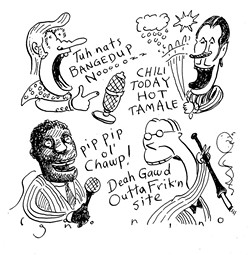
- Slug Signorino
I've always wondered about a phenomenon I call "newscaster's voice." No matter who's reporting the news, they use the same tone and cadence. Why? What would happen if a reporter tried reading the news in their casual speaking voice?
—Zach Dewoody
This phenomenon doesn't strike me as too mysterious, Zach. For one thing, professionals just tend to enunciate better than the rest of us slobs; if newscasters were to use a casual speaking voice, they'd sound like everybody else—mostly intelligible, occasionally garbled. But you can't expect viewers to DVR the broadcast and rewind as needed, so news-team types aim for maximum clarity the first go-round, by speaking more slowly and precisely, and by tailoring their sentences to the form. You'll notice that broadcast writing doesn't involve many subordinate clauses, parentheticals, long participial phrases, etc. That's by design: simple sentences, clearly delivered.
Some newscasters, I'll grant you, employ a certain sing-song inflection, placing unexpected stress on less important words, like prepositions; this may be an overcorrection to a fear of speaking monotonously, the quickest way to lose an audience. And of course, in any field people tend to emulate those who've successfully done the job before them, and so part of what you're hearing may be a Xerox of a Xerox of a Xerox of, say, Edward Murrow—a delivery style that once suggested gravitas but, to today's ear, rings a little false, especially having been distorted by a 75-year-old game of telephone.
That said, there's another key trait American newscasters share, and that's their accent, widely understood as a kind of national default. Today, news-speak corresponds to the accent called General American, and reflects the way many people around the country actually talk. But 75-plus years ago, the lingua franca of broadcast news, Hollywood and the elite at large was far different—a distinct reflection of upper-class mores. Think of Franklin D. Roosevelt, born rich and prep-school-educated, telling us there's nothing to feeah but feeah itself. Where the hell did that come from—and where did it go?
What's been dubbed the Mid-Atlantic accent was basically made up: an elite affectation, so named because it sounded like it originated somewhere between Britain and the U.S. East Coast. Its American speakers were aiming at the English accent known as Received Pronunciation, aka "Oxford English" or "BBC English," for generations of Britons a marker of proper breeding and/or schooling. Elements of RP got an American foothold by way of early-20th-century speech educators teaching what they called "World English," a prefab "cultivated" accent characterized most distinctively by a mishmash of English and American vowel sounds, and by what's called nonrhoticity—elided R's at the end of a word (as in fear) or before a consonant (hard). Nowadays, Mid-Atlantic is most familiar to devotees of 1930s movies; in more recent memory, we've heard it in caricature form on the TV show Frasier, plus as embodied by the human caricature that was William F. Buckley.
The most prominent theory for its disappearance, advanced by the linguist William Labov, suggests that with Britain's descent from imperial pre-eminence following World War II, Americans simply lost some of their Anglophilic awe and started to embrace distinctly American-sounding figures—out with Cary Grant, in with Jimmy Stewart. Another view sees the emergence of General American as a darker, more xenophobic trend: It wasn't so much that people stopped copying the English but that they started to embrace Midwestern and Western speech as somehow more truly American than the "ethnic" accents of the Northeast.
Whatever the reason, the General American accent that supplanted Mid-Atlantic as the American cultural lingua franca isn't widely regarded as having any conspicuous regional affiliation—these days, it may as well be an accent from nowhere. But where, precisely, is nowhere?
You got it: Nebraska. "It's no accident," one observer noted, "that Johnny Carson, Tom Brokaw and Walter Cronkite all come from this region of the country," and these three helped set U.S. standards for no-nonsense credibility in the latter half of the 20th century. That observer, by the way, was actually a telemarketing executive, explaining to The New York Times back in 1991 why Omaha was such a hot ticket in his industry: people calling from there sound like the American default.
We can expect to hear General American for a while. Mass communication may be slowing what would otherwise be natural evolutions in the way people speak; nobody in the United States lives in geographical isolation anymore if they've got a TV or computer, which helps GA in its hegemony. Among newscasters, GA conformity is rigidly enforced on the regional level; local anchors tend to be a highly mobile bunch, so there's incentive for a Texas-born reporter looking for work in a northern market, for example, to ditch the drawl.
And then there's good old-fashioned American parochialism. A 2005 article by NPR's ombudsman reported that black and Latino reporters sometimes felt pressure to adjust their accents, in part via comments from listeners who "perceive ... [a] kind of flaunting of the reporter's ethnicity." We prefer nonstandard accents, in other words, only if they're a fiction of the wealthy.
Send questions to Cecil via StraightDope.com or write him c/o Chicago Reader, 350 N. Orleans, Chicago 60654.